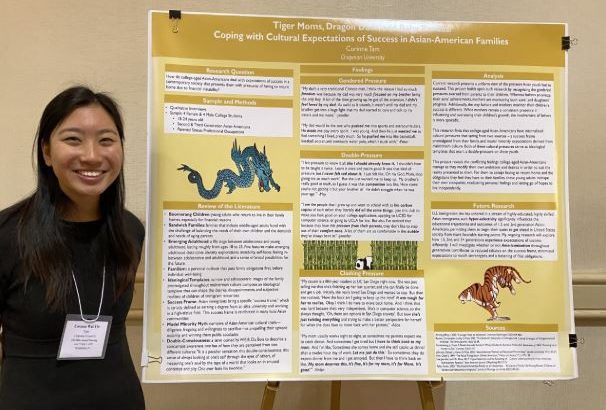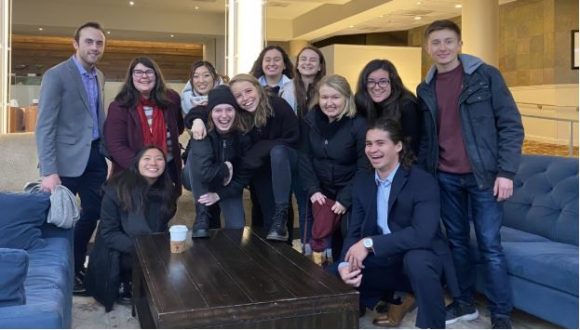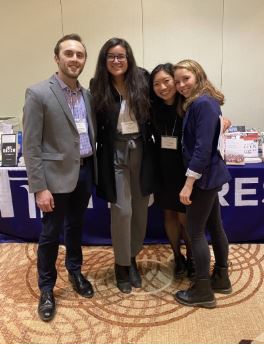
Corinne Tam wins The Best Undergraduate Award at Eastern Sociological Society Annual Meeting
March 13, 2020
Corinne Wai Yin Tam (‘20, Sociology), President of Wilkinson College’s Sociology Club, was awarded the Eastern Sociological Society Annual Best Undergraduate Award for her paper, “Tiger Moms, Dragon Dads, and Baby Pandas: Cultural Expectations of Success Among Asian-American College Students.” She presented this paper at the Eastern Sociological Society (ESS) Annual Meeting in Philadelphia, which was Tam’s first national conference presentation.
Tam’s paper discusses the levels of pressure that Asian American youth undergo as they live under the rules and expectations of their parents. It is a discussion that has become increasingly important for young Asian Americans today, especially in terms of their success and expectations.
We are Wilkinson sat down with Tam to talk about her experience presenting her paper at this conference.
—
We are Wilkinson: What motivated you to present at this conference?
Corinne Tam: Last spring, the Sociology Club attended the Pacific Sociological Association Annual Meeting in Oakland to engage in sociological conversation and gain professional experience. I remember watching one of our club members present his research on veganism and masculinity at a roundtable session and being inspired to do something similar with my own project. Attending the Eastern Sociological Society Annual Meeting in Philadelphia last weekend allowed me to do that.
WaW: This being your first national conference that you have presented at, what were some of the things you were nervous about?
CT: I was both nervous and excited to have others’ thoughts about the project and see how it could be improved.

Corinne Tam (bottom left) and Chapman’s Sociology Club attended the Eastern Sociological Society Annual Meeting
Like the past conferences I shared this research at, I had many intriguing conversations at ESS that I hope to incorporate into future research. For example, an Asian American student spoke to me about how he related only partially to the experiences of the double pressure my respondents felt because he was adopted by a white family. With this, our interaction gave me ideas about exploring the differences between Asian American families’ success frames and white families’ expectations of success.
WaW: What were some of your favorite things about working on this paper?
CT: This research project is special to me because it stemmed from my own interests in sociology. In that way, I really have enjoyed it from the start. In having this opportunity and getting to experience every step of it, I have learned about the research process and become more certain about my goal of continuing to pursue sociology in graduate school.
This research project has also been a highlight of my time at Chapman because of the opportunity to be guided by and exchange ideas with professors both within and outside of sociology. I’ve also enjoyed the experience because it has led me to conversations in so many different places with so many different people.
WaW: At a time when Asian representation is on the rise, why was the topic of Asian American youth success so important for you to talk about now?
CT: I had no idea that this was something I wanted to study. Ideas were assembled from conversations I recalled having with my friends from home.
One friend in particular sparked my interest in this topic. She was the first person to go in-depth about the “double life” she had lived. She had told me about her experiences at her college, enjoying what she felt were the first breaths of freedom from overbearing parents by joining a sorority and learning to deejay.
Despite these new and exhilarating opportunities, she continued to feel the weight of her parents’ expectations as she maneuvered through her undergraduate studies. She told me about her newly grown passion as a deejay, being invited to play at different events, going to perform at these venues, and then having to tell people that she had to “move her car” while she rushed home to meet her 12 a.m. curfew.
It was after hearing these kinds of stories that I became more aware of similar feelings and tensions in conversations with my college-aged, Asian-American friends, helping me realize that there are patterns that are not necessarily recognized by society, and sometimes even by this population themselves.
WaW: So you have mentioned that you were thinking of expanding your research? Can it be expanded to explore other communities of color?

Tam poses with fellow Chapman Honors Program students (left to right) Matt Joy (’20), Marisa Quezada (’22), and Glennan Keldin (’21).
CT: This is something one of my thesis advisors, Pete Simi, had pointed out to me just before attending ESS. He talked about how this study is just one case of how this life stage, emerging adulthood, is experienced by non-white people.
I think the implications of this study can reach farther than awareness of Asian American experiences. Similar pressures may be experienced by other people of color as well. I would really love to look deeper into the degree to which other groups relate to the experiences of my respondents based on differences in parenting values, societal stereotypes, and family principles.
WaW: What do you hope others can take away from your experience presenting your paper?
CT: A highlight for me was that it seemed to come full circle; I think some of the new Sociology Club members felt a similar sense of enthusiasm and motivation for research that I did after attending the conference and seeing the presentations, which is really exciting.
I hope this project encourages other students in Sociology and in Wilkinson as a whole to conduct research and attend conferences. One thing I have learned throughout my time at Chapman is that the university, specifically our college, offers many resources for student research and travel. For other students interested in participating in research and conferences, I’d highly recommend looking into and making the most of what Wilkinson has to offer!

